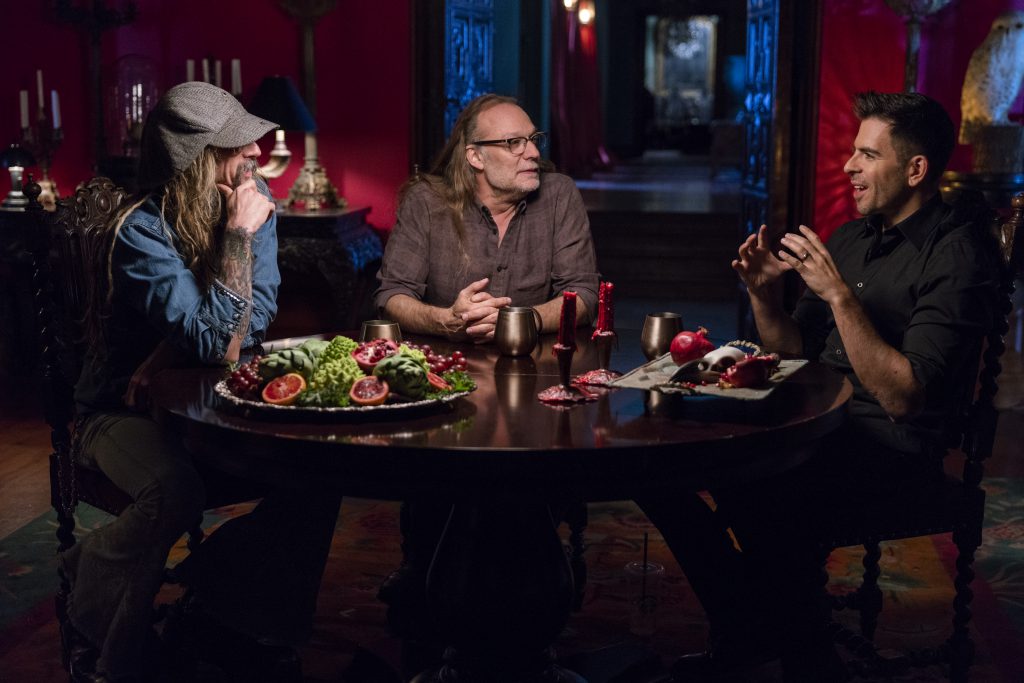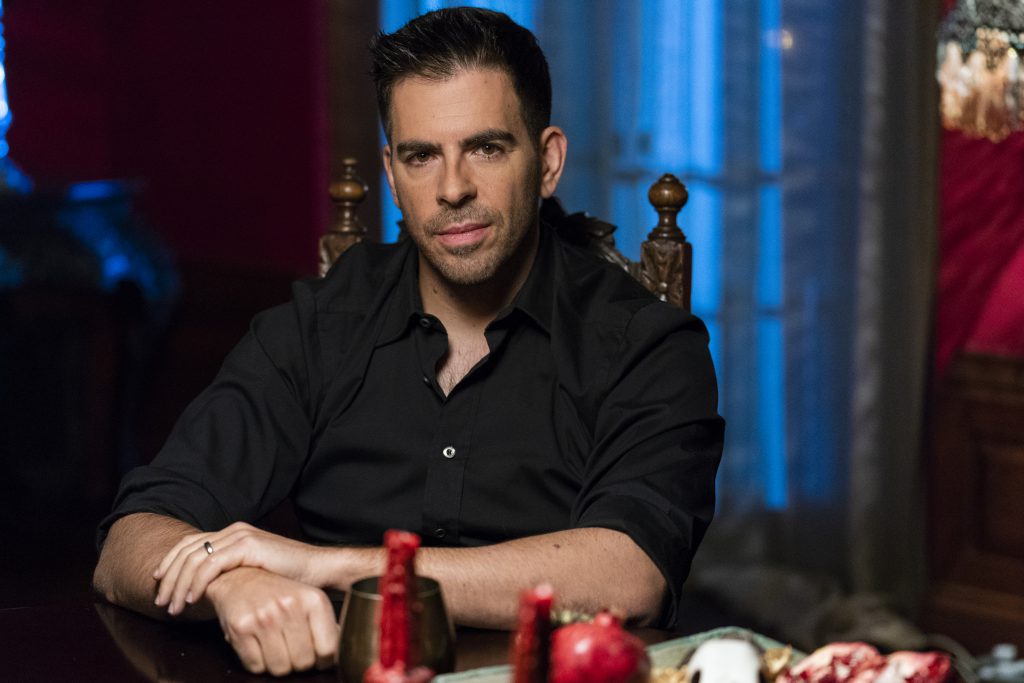Eli Roth Digs Up “The History of Horror”! (Interview)
Eli Roth knows horror. With movies like Cabin Fever, Hostel and Grindhouse under his belt, he is undoubtedly an expert in the field of fright. Last year Mr. Roth took his love to a whole new level with AMC’s hit series, Eli Roth’s History of Horror which won a 2020 RealScreen Award for outstanding achievement in Arts and Culture Programming.
“Season Two of Eli Roth’s History of Horror digs even deeper into the catacombs of creepiness, exhuming landmark films and cult classics while chewing on the entrails of recent horror cinema. The series explores the dark power and wicked fun of scary movies, the craft that went into making them, and the ways that horror films reflect the anxieties of their times. The story is told by Eli Roth and a celebrated cast of writers, directors, actors, cinematographers, composers, and special effects artists who bring our nightmares to life.”
Crooked Llama had the awesome opportunity to excavate the inspiration behind the horror. Is there some significance behind the spine-chilling stories? Check it out…
Linda: I recently finished watching The History of Horror Season 2… loved it! I find it enhances my appreciation for a genre I have always loved. Could you talk a little bit about how the show was conceived? What was the goal?
Eli: Thank you! I had been wanting to make a show like this for years that showed horror films in their historical context, and how they were reflecting the fears at the time and what makes them so relevant 30, 40 even 80 years later. Why are we still talking about Reanimator and why do kids still watch the original King Kong? But more than that, I felt we were losing the creators of so many iconic films and I wanted to capture their stories. I’ve had the good fortune of getting to meet my idols, I was with H.G. Lewis at a film festival in 2011 and he told the funniest stories, but then he died shortly after. Then we lost George Romero, Wes Craven, Tobe Hooper. When they die, their stories go with them, but the movies stay forever. Even this past year we lost Joel Schumacher and Stuart Gordon, and we were lucky enough to hear their stories on the show before we lost them.
“No other genre inspires the kind of fan loyalty that horror does.”
Comedy tends to get dated, it really has to be seen in the time in which it was made to be fully appreciated, dramas you can watch again but nobody’s really getting tattoos of them. I’m not knocking these other genres but a great horror movie can still be enjoyed 100 years from now.
Linda: There are many top-notch guests weighing in on each episode. Have any of them offered an opinion/analysis you found surprising? If so, what?
Eli: Sometimes a creator will say they hate a movie, which is surprising, and I tend to keep it to out of the show because I know the director of that movie would just feel slighted. But to get to talk about The Shining with Stephen King and find out why he doesn’t like Kubrick’s adaptation was amazing, because he definitely has an appreciation for its aesthetic, just not the emotional content. Also, he really loves Cujo and I see why, but I would not have picked that as one of his favorite adaptations of his. But after we discussed it, it makes perfect sense, and if it were released today you could see Dee Wallace getting awarded for her superb performance. This season I was amazed at Bill Hader’s horror knowledge, I loved hearing stories from Nancy Allen and Keith Gordon about Brian DePalma, and was thrilled to have Megan Fox on because she was so open and real and raw about her experience from that period during Jennifer’s Body. The film was torn apart by critics and over time has become a cult classic. It was nice to sit with her and feel the satisfaction that the fans really connect with her performance today more than ever, what she did is so real and so raw that teenagers today really really relate to it. But everyone has surprised me in some way. Ari Aster dissecting DePalma’s camerawork in the prom scene from Carrie, it’s fantastic, I love directors geeking out on other directors.

Linda: I am a connoisseur of Mr. Stephen King’s tales and adaptation offers seem to come quicker than he can even write. If you could bring one of his stories to life on the big screen, which would it be and why? (Re-makes acceptable)
Eli: I love King and I enjoy his adaptations. I’ve always loved the story Beachworld. I had been attached to both 1408 and Cell but never got the scripts right and left the projects for various reasons. I’d also love to do Salem’s Lot, one of my favorite stories. I love Tobe Hooper’s miniseries, but that’s a fun world I’d love to live in. Growing up in Massachusetts, and I love the east coast fall horror with that aesthetic.
Linda: Movies, books, tv shows etc… we live in a society obsessed with horror. What do you believe is the draw to this genre? Do you feel our current state of affairs (global pandemic) has an impact?
Eli: Everyone feels terror but we’re not allowed to express it. Horror gives us a safe forum to discuss the un-discussable. Look at Get Out, it addressed racism in a way that everyone could talk about the characters, but really it’s things we all saw around us. People see themselves both as the monster and the victim in some ways, and horror gives you a framework to talk about these feelings. Everyone has a monstrous side, and we all keep it in check, but it comes out in strange ways. The only time we deal with these things honestly is in our dreams, when we’re unbridled. But in real life we can’t scream, we can’t rage, although when you take away our activities, our work, our entertainment, our sense of purpose or accomplishment, look at what happens. I’ve heard from more people in the pandemic watching my films and also podcasts dissecting them. It started with Cabin Fever, but with the activism in Green Inferno and then the chaos in Aftershock and then people buying guns, Death Wish. It’s endless.
“My films have always dealt with the clash of culture and breakdown of society in some way, and right now we’re seeing both.”
It’s terrifying. But horror gives us all a safe place to express and deal with those feelings. I sleep much better after a good scary movie, it’s like the exhaustion of getting off a rollercoaster.

Linda: There are numerous categories in the horror realm… gore, psychological, monsters, supernatural, paranormal, etc… How can you predict what an audience wants? Is there an ebb and flow to their creepy desires? What is your favorite and why?
Eli: There’s no way to predict, you just have to go with what scares you and try to make it relatable to other audiences. I’m terrified of the loss of control of your body, whether it’s flesh-eating bacteria or someone chopping you up for fun, or eating you because you’re their protein source, it’s just a fear I have. I don’t know where it comes from, but it always manifests itself in some way in my films. James Wan’s social media handle is @CreepyPuppet, and look at the Saw and Annabelle films. It’s all right there. Other directors have their own obsessions. Rob Zombie loves that carny / Manson family outlaw dangerous aesthetic, and it comes from his childhood working in carnivals and seeing people behave in terrifying ways. Jordan Peele and Ari Aster have their own phobias and they just put it all out there on the screen. The crazy thing is you never know when you’re tapping into a larger fear like I did with torture in Hostel or Jordan with Us or Ari with Hereditary. There’s just something in the air, you can’t predict it, you just have to make the movie as honest and scary as possible and if it hits, it hits. Only years later do we often understand why, and that’s what the show goes into.
“We discuss the mortgage crisis leading to mass homelessness and displacement and the direct rise of The Walking Dead. It was the right show at the right time brilliantly done that really tapped into something under the surface we were all quietly dreading even if we didn’t want to admit it consciously. Great horror does that.”
Linda: How has technology and social media impacted the horror industry? Do you believe it has hurt or helped its progression?
Eli: I think it has helped fans connect and find each other, especially on Instagram with things like #InkTober. You used to be the weird horror fan, but now you can connect with your people all over the globe, it’s beautiful. It’s also fun to really directly interact when you put something out there. As a filmmaker, Social Media does take time away from writing, and I don’t feel it enhances my creativity so I’ve gone off it for the most part. It’s really a question of where I want to put my energy, and that’s into the work itself. The instant satisfaction of a ‘like’ is fun, but it’s not real, if you want the real satisfaction you have to dig deep and put the time in to truly understand the journey is the reward.

Linda: What scares Mr. Eli Roth?
Eli: The world is a scary place. America hasn’t been through this kind of political instability in a long time, and I see people taking sides of Left vs Right, and once you categorize someone you dehumanize them and people can do terrible things. Even in Hostel once someone was your victim, the people who paid felt they had the right to do whatever they wanted. Once you put someone in a box they’re no longer a person, and people feel like they have permission to just destroy them. It’s terrible. I miss music festivals because they really united the crowd and political opinions didn’t matter. It was about celebrating as humans, being together, but with that stripped from us, we’re left to judge people by their social media posts and that’s when the venom comes out.
“So when people stop seeing each other as humans, who basically want the same thing which is a happy life and love and to be able to express yourself in the world, that’s what scares me.”
A big thank you to Mr. Eli Roth for sharing his spooktacular insights. Don’t miss The History of Horror Season 2 premiering Saturday, October 10th EST on AMC!





